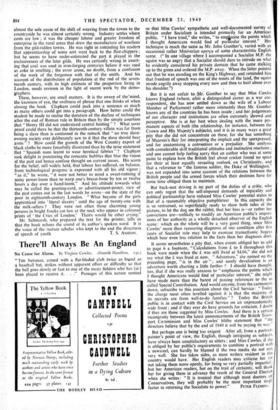There'll Always Be An England
No Cause tor Alarm. By Virginia Cowlcs. (Iianthh Hamilton. cs.) "THE batsman, armed with a flat-bladed club twice as broad as a baseball bat, strikes without apparent effort or difficulty so that the ball goes slowly or fast to one of the many fielders who has [sic] been placed to receive it. . . ." Passages of this nature remind
us that Miss Cowles' sympathetic and well-documented survey of Britain under Socialism is intended primarily for an American public. "I have tried," she writes, " to empkasise the points which I thought Americans would find of particular interest." Her technique is much the same as Mr. John Gunther's, varied with an occasional rather Miniverian apercu of some characteristic English scene. (" In one village where I accompanied a Socialist M.P. the squire was so angry that a Socialist should dare to intrude on what he evidently considered his private domain that he came stalking up to the green and ordered the M.P. away. When the latter pointed out that he was standing on the King's Highway, and reminded him that freedom of speech was one of the tenets of the land, the squire strode angrily away stopping every now and then to hurl abuse over his shoulder.") But it is not unfair to. Mr. Gunther to say that Miss Cowles knows England (where, after a distinguished career as a war cor- respondent, she has now settled down as the wife of a Labour Member of Parliament) rather more intimately than Mr. Gunther knows any of the countries he has been inside ; and her judgements of our character and institutions are often extremely shrewd and perceptive. She is at her best when dealing with the more per- manent aspects of both (the relationship, for instance, between the Crown and His Majesty's subjects), and it is in many ways a great pity that she did not concentrate on these, for she has something of Maurois's flair for interpreting the implicit and the unexpressed, and for anatomising a convention or a prejudice. She analyses with considerable skill traditional attitudes and instinctive reactions ; and one cannot help feeling sorry that an author who was at some pains to explain how. the British feel about cricket found no space for their at least equally revealing outlook on Christianity. and that a reference to " the famous soldier, the Duke of Wellington," was not expanded into some account of the relations between the British people and the armed forces which their destinies have for some time obliged them to maintain.
But back-seat driving is no part of the duties of a critic, who can only regret that the self-imposed demands of topicality and political partisanship have reduced Miss Cowles' potential status to that of a reasonably objective pamphleteer In this capacity she is so restrained, so superficially ready to show both sides of the picture, to let the dog see the rabbit, that her bias is—or rather her convictions are—unlikely to modify an American public's impres- sions of her authority as a wholly detached observer of the English scene: which on the whole will be a very good thing, since Miss Cowles' more than reassuring diagnosis of our condition after five years of Socialist rule may help to exorcise transatlantic bogeys which bear even less relation to the facts than her diagnosis does.
It seems nevertheless a pity that, when events obliged her to add to page 6 a footnote, "Calculations from £ to S throughout this book were made when the £ was still fixed at S4.04," she did not say what the £ was fixed at now. " Adventure," she opined on the preceding page, " is in the air " ; and surely devaluation is an adventure worth charting a little further I should have thought. too, that if she was really anxious to " emphasise the points which 1 thought Americans would find of particular interest," she might have made more than the barest of passing references to the so called Special Contribution. And would anyone, from the cartoonists down, subscribe to this assertion about the Civil Service: "Today the charge most often levelled against it is that the majority of its recruits are from well-to-do families" ? Today the British public is in contact with the Civil Service on an unprecedentedk wide front ; and if they ever do have grounds for criticism, If doubt if they are those suggested by Miss Cowles. And there is a certain incongruity between the latest announcements of the British Trans- port Commission and Miss Cowles' blithe statement that "the directors believe that by the end of 1949 it will be paying its was But perhaps one is being too exigent After all, from a portrait- painter's point of view, the English, though intriguing as subjects. have always been unsatisfactory as sitters ; and Miss Cowles. if she is obliged by her public's requirements to combine a portrait with a newsreel, can hardly be blamed if the two media do not mi\ very well. She has taken sides, as most writers resident in thi, country would have. Het English readers may criticise her for not taking them more openly, for being so very partially impartial but her American readers, hot on the trail of certainty, will thank her for giving them in advance the result of the General Election when she writes: " It is ironical that although most doctors arc Conservatives, they will probably be the most important singl:
factor in returning the Socialists to power." PETER PLEMIN1,.


































 Previous page
Previous page